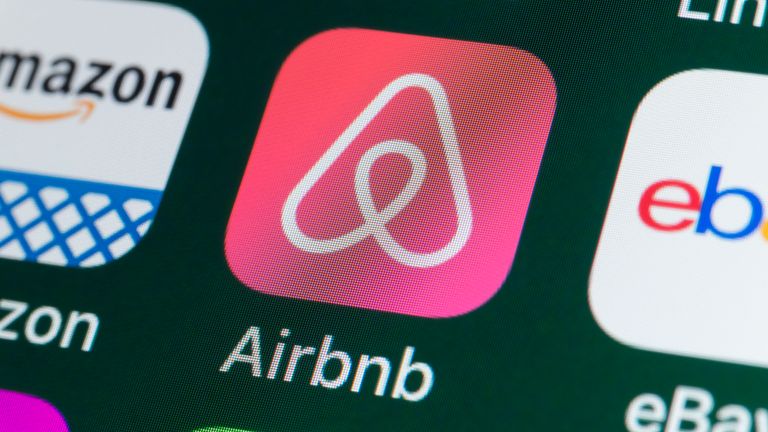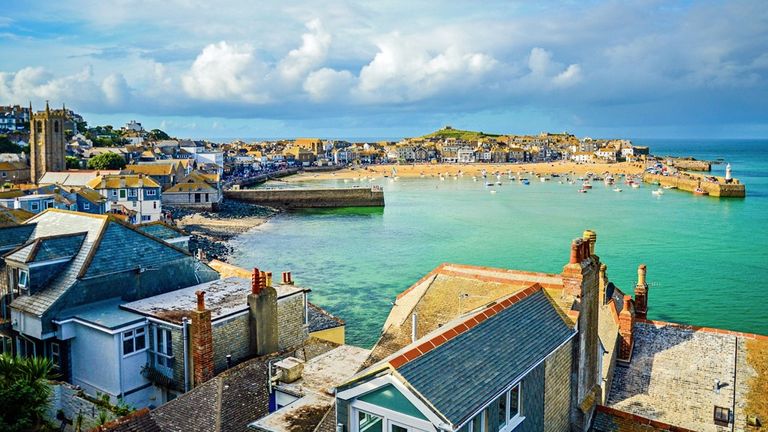Has the Airbnb bubble burst?
Airbnb was once the darling of the holiday market, but hosts are now complaining about a sudden drop in bookings - while some former rental homes are being put up for sale as cities bring in restrictions.
Monday 9 December 2024 14:56, UK
While struggling to pay their bills in 2007, two San Francisco residents began renting their spare room out to conference-goers when all the hotels in the city were full.
Less than two decades later, what started life as AirBedandBreakfast.com has done nothing short of revolutionise the travel industry.
More than five million hosts, in almost every country across the globe, have followed in the footsteps of Joe Gebbia and Brian Chesky and opened their homes to more than two billion guests through Airbnb.
But as the company grew, so have the accompanying problems: from viral Airbnb horror stories to protests from local communities who argue they have been priced out by landlords buying up properties to turn into holiday lets.
Then there's competition. Booking.com tells Money it is now two-thirds of the size of Airbnb when it comes to alternative accommodation (so not just hotels) - of the 29 million listings on its site, more than 7.8 millions are in homes, apartments and other unique places to stay.
Airbnb 'scapegoated' in Cornwall
Nowhere in the UK springs to mind more quickly than Cornwall in the battle over short-term rentals, with Airbnb often cited as the reason for over-tourism and the housing shortage for beleaguered locals.
A report commissioned by Airbnb, however, found it has little to no significant impact on housing in the vast majority of the UK.
In Cornwall specifically, Airbnb data shows most hosts in the area list one space, for less than four nights a month, and 40% say the extra income helps them to afford their home.
Read more: What I learned from putting my spare room on Airbnb
Oliver Monk, councillor for housing, says part of the problem is that Airbnb has become so successful it has become the "generic name" for short-term letting - in the same way we talk about hoovering the house, or putting leftovers in Tupperware.
"People will say to me 'I'm going to Airbnb my house for six weeks in the summer' - but they might actually be using another site entirely," he says.
"I bet Airbnb can't stand that because their brand name is constantly attached.
"And I think that is partly the reason they have been so proactive in trying to set up a central register to level the playing field."
Perhaps surprisingly, he adds: "In a way, I have got sympathy with Airbnb.
"I haven't got Booking.com ringing me up and saying 'yeah we need a register' because they are sat behind the shield of the Airbnb brand name."
And housing problems can't be blamed solely on short-term lettings, he says: "The current system we have got doesn't deliver housing quickly enough."
Which areas are clamping down?
Popular holiday destinations including London, Edinburgh, Paris, Czechia and Rome have all introduced varying restrictions on all short-term lets.
In Barcelona, the city's mayor has promised to phase out short-term letting licences entirely by 2028 in a bid to return 10,000 apartments to the residential market.
While London's restrictions have been around for almost eight years, Czechia has become one of the latest countries to clamp down on Airbnb with a draft bill, approved by the government, which will allow municipalities to limit Airbnb-style accommodation. This can vary, but could include capping the number of days a property can be rented out, as well as defining the minimum amount of space required per guest.
It would also place stricter rules and taxes on guesthouses, Airbnbs and other holiday rentals, bringing them into line with traditional hotels.
Dennis Darwiche rents out three Airbnbs in Prague via a "rent to rent" scheme - this means he rents them off the building's landlord and in turn rents them out to holidaymakers.
"Many locals complain it is too touristy," he says. "But if the law comes into effect and restricts Airbnb, the hotels won't have capacity to take all the travellers - so what happens then?
"Well, the prices will increase and we will have fewer tourists."
He says if they bring in rules restricting the number of days he can rent the apartments, he will have to consider giving up the business.
'I've had to slash my prices to barely break even'
Has all the bad press around Airbnb affected bookings? We asked London hosts for their experiences...
Pat
I was a superhost for 3/4 years and came off the platform. When Airbnb raised their fees it left little room for me to raise my prices as I would not get many bookings, so I had to lower it to get bookings back in.
Claire
I've been a host since 2011 (Superhost and normally renting single rooms in my shared home). I've always been fully booked nearly 100% of the time and my earnings went up every year with the exception of 2020 and 2021. There was a massive jump in what people were willing to pay in 2022 and 2023 and now I've gone back down to a 2014 level so, for me, a bubble has definitely burst.
I'm about 90% booked if I drop my prices enough but I've had to absolutely slash my prices. I find that sometimes with wear and tear, bills and cleaner fees, (which have gone up significantly) I'm barely breaking even. There are a lot of new hotels near me, which I think have taken my weekend customers - I used to charge almost double at weekends but now I have to charge the same or less than during the week.
Michael
We rent out an entire flat which means a 90-day limit in London. We have to make our money from the 90 days - we could do more. We are fully booked and could do more than the 90 days but Airbnb shuts down on us. Our council tax has doubled and we now have to consider how we go forward... there appears to be a turning against landlords from powers that be at the moment but hoping to ride it out.
Yolanda
I'm a guest favourite superhost and I'm fully booked. I've been hosting for 1.5 years and have had really good experiences so far. 99% of my guests are lovely and respectful. I also use Airbnb when I travel and I love it. My one gripe is Airbnb should do more to protect the hosts - they are very guest-centric.
Tasmin
I'm a super host and guest favourite and I've found that bookings seem to come in much more last minute and there is a higher price sensitivity but I'm still nearly always full just with much less certainty and a slightly lower nightly rate. I'm at the higher end of price and quality of room so that might be impacting things for me.
Airbnb a 'frustrating share to own'
Airbnb's core business model is "easy to understand", says Dan Coatsworth, investment analyst at AJ Bell. And while the key to its success is the continued growth in hosts on the platform and the volume of bookings, there are some big challenges for the company.
With competition from hotels and chains, "sustaining momentum is hard", he told Money.
Another issue is helping hosts drum up business during non-peak times.
"Many hosts might find they struggle to attract people during certain times of the year and that can put them off using Airbnb permanently, saying it's not worth the effort," he said.
But, "longer-term, it's possible to see Airbnb broaden its services letting car owners rent their vehicles to others", he adds.
Yet it has been a "frustrating share to own" for anyone who has invested in the company.
"Despite having a well-known brand and growing profits, the stock hasn't enjoyed the kind of gains seen by other big US names," Dan says. "Many investors are concerned that sustained earnings growth will be hard to achieve."
It joined the stock market in December 2020 with an IPO (initial public offering) priced at $68 a share. This immediately jumped to $165 on the first day of trading.
"Unfortunately, most investors were only able to buy once the shares hit the market and the first available market price was $146.
"Today, the shares trade lower than this level at $133. The share price has been like a yo-yo - experiencing big swings upwards since joining the stock market, but soon falling back again."
Breaking the rules?
HMRC has launched investigations into nearly 2,000 holiday lets in the UK (up from 375 the year before and 95 the year before that), according to a Freedom of Information request submitted by The Daily Telegraph in May this year.
Those under investigation are suspected of failing to declare their income. Under the UK's rules, there is a £1,000 tax-free threshold on all second income, and a £7,500 threshold if you rent a furnished room in your home.
Under the previous government, the rules around holiday rentals also changed, as Jeremy Hunt abolished certain incentives to discourage out-of-towners from purchasing second homes in popular spots.
The future of travel to #Airbnbust
Airbnb was once the darling of the holiday market, the future of travel - there was a time when I rarely booked a holiday without it.
Now, searching #Airbnbust online, there is no shortage of hosts complaining about a sudden drop in bookings, or former rental homes being put up for sale as cities bring in restrictions. One owner claims he is losing $600,000 (£463,000) a year on his 70 properties.
Yet the popularity of short-term rentals on other sites, like Booking.com, suggests people haven't given up on the short-term letting market.
Be the first to get Breaking News
Install the Sky News app for free


And the sun hasn't quite set on the "beloved brand", says Daniella Bianchi, chief strategy officer at management consultancy Interbrand.
"Look at their revenues right now - most come from overnight stays, but at least 17% is coming from stays of more than 30 days," she tells Money.
"This is such a potential avenue for growth for them."
The brand itself, and its leaders, are still young, she adds: "There is still so much more they can do."
So while Airbnb's growth and popularity meant its own name became synonymous with the entire market - and all the problems that came with it - it also meant it "became part of the zeitgeist".
This, Daniella says, is "what every brand wants".
Airbnb has been contacted for comment.





